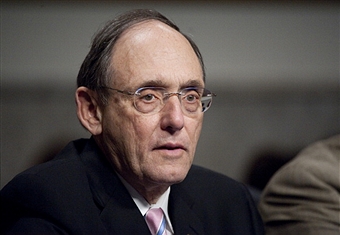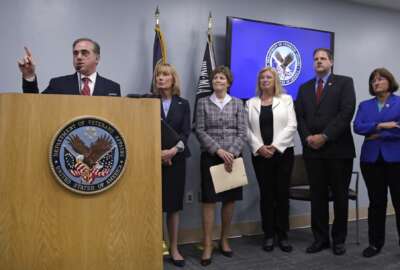
GAO slams VA’s failure to report poor-performing doctors
In Today Federal Newscast, the Veterans Affairs Department failed to report 90 percent of its poorest-performing doctors to a national database.
To listen to the Federal Newscast on your phone or mobile device, subscribe on PodcastOne or iTunes.
- The Government Accountability Office said the Department of Veterans Affairs failed to report 90 percent of its poorest-performing doctors to a national database. GAO looked at a sample of disciplinary cases involving clinicians at five hospitals, and found that only one out of nine providers were reported for misconduct or lack of competence. None of the cases were reported to state licensing boards. GAO also found significant shortcomings in the way VA investigates concerns about doctors. VA was unable to provide records in about half the cases, and some languished for years before a formal investigation had even begun. (GAO)
- Veterans Affairs Secretary David Shulkin said there are 40,000 homeless veterans on any given night across the United States. Shulkin made the comments at the opening of a new veterans facility in the District of Columbia. He did so along with Housing and Urban Development Secretary Ben Carson, just as HUD is due to release its 2017 homeless figures. Just under 40,000 veterans were said to be homeless in HUD’s 2016 report. It’s unclear if Shulkin was referring to 2016 numbers or was providing a preview of the 2017 figures. Carson and Shulkin said more cities across the country are declaring an end to veterans homelessness, and pointed to the D.C. facility as a model for others they want to open across the country.
- Airmen are eligible for continuation pay at 12 years of service, in return for a commitment of four years of service. The Air Force announcement of the continuation pay is an incentive for airmen covered by the new Blended Retirement System to re-up. For active-duty airmen, the payment rate is 2.5 times their monthly basic pay. The same rate is offered to reserve component airmen on active guard and reserve orders. (Air Force)
- Many civilian agencies are reported to be seeking more guidance and information from the Office of the Director of National Intelligence on its continuous evaluation program. The Government Accountability Office said ODNI needs to set more concrete standards for the program. The continuous evaluation program is an executive branch effort to more frequently identify and evaluate security-related information, including criminal activity. Agencies said they are concerned about the costs and workload associated with adopting continuous evaluation. The Defense Department is going all in on the program. The Pentagon is counting on continuous evaluation to eventually replace much of their periodic re-investigation workload. (Federal News Radio)
- The General Services Administration said citizens could soon authenticate themselves to the government through facial recognition. That is one way GSA’s Technology Transformation Service is asking vendors to provide authentication services under the Login.gov platform. GSA has released a request for quotes (RFQ )seeking a vendor to collect documentary evidence of identity data and then send that information in real-time to GSA. GSA then will determine whether that evidence meets its requirements to authenticate the individual’s identity. Bids on the RFQ are due Dec. 8. (FedBizOpps.gov)
- Sen. James Lankford (R-Okla.) has blown the whistle on waste in government spending in his annual “Federal Fumbles” report. Lankford identified more than $400 billion in waste in the federal budget. This year’s report includes everything from offbeat arts grants that are worth less than $40,000, to more serious big-budget items like the multi-billion-dollar production delays on the F-35 Joint Strike Fighter. Lankford also cited projects like the decade-long refurbishment of the Air Operations Center, which swallowed nearly double the estimated cost of $374 million, due to its own poor planning and contractor mistakes. He also called into question the $1.5 billion spent each year on government agency public relations. (Federal News Radio)
- The Department of Homeland Security Office of Inspector General has cited Customs and Border Protection for taking insufficient steps in resolving a computer outage last January that stalled airline passengers for hours. The DHS IG said the agency’s reaction time was good, and that CPB personnel took sufficient steps to fix the problem, but that it required four hours to revert to an older system. Long-term, the IG said the agency must fix inadequate software testing, maintenance, and continuity planning. (DHS OIG)
Copyright © 2025 Federal News Network. All rights reserved. This website is not intended for users located within the European Economic Area.
Related Stories
Getty Images/Bill Clark




